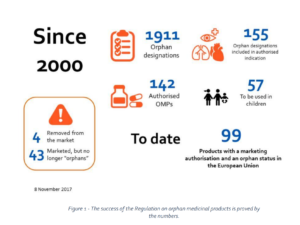

Approximately 7,000 rare diseases affect an estimated 30 million people in the United States, and only 5 percent of rare diseases have FDA-approved treatments. The ODA provides incentives, including tax credits and exclusive marketing rights, for manufacturers to develop drugs to treat rare diseases, which are typically defined as affecting fewer than 200,000 people in the United States. However, many patient advocacy groups noted that granting ODA incentives in these circumstances is needed to encourage drug manufacturers to study the safety and efficacy of drugs in rare disease populations. For example, several stakeholders were critical of manufacturers obtaining multiple orphan designations-and ODA incentives-for the same drug when the drug may otherwise be profitable from treating multiple patient groups. Stakeholders GAO interviewed and research GAO reviewed identified a number of rare disease drug development challenges, such as the difficulty in recruiting small populations for clinical trials, with differing opinions about the ODA incentives. As such, FDA cannot be sure that reviewers are conducting complete evaluations that include all critical information needed for assessing its criteria. For example, 48 of 148 review templates GAO analyzed were missing information on the drug's U.S. However, GAO's analysis of 148 designation review templates found that FDA does not consistently record or evaluate background information when making designation decisions. Officials told us this information provides important context, such as whether FDA has experience with a little known disease, critical to ensuring a complete designation application review. To inform their evaluation, reviewers must record certain background information in a standard review template, such as the drug's U.S. In evaluating designation applications, FDA reviewers generally apply two consistent criteria-(1) the size of the rare disease population, and (2) the scientific rationale that the drug may effectively treat the disease. Orphan Designation Applications Received and Designations Granted from 2008 to 2017, as of April 2018 As the number of orphan designation applications received and granted has grown, FDA outlined several process changes in its June 2017 modernization plan to improve designation review timeliness and consistency. Drugs granted this designation treat rare diseases and may receive various incentives under the Orphan Drug Act (ODA). The Food and Drug Administration's (FDA) Office of Orphan Products Development is responsible for reviewing drug manufacturer applications for orphan designation.


 0 kommentar(er)
0 kommentar(er)
